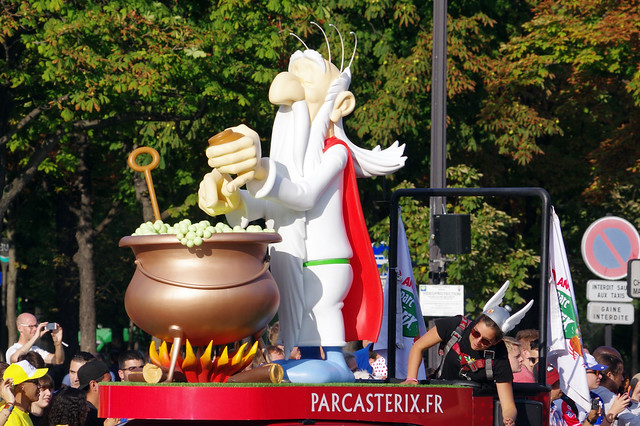To me the word druid makes me think of Getafix, the druid in the Asterix comics – an old man with a long white beard who brews magic potions in a big cauldron. He has other names, such as Panoramix in many other European languages, and Kensawthetrix (“knows all the tricks”) in Scots [More details].
According to TheFreeDictionary, a druid is:
- a member of an ancient order of priests in Gaul, Britain, and Ireland in the pre-Christian era
- a member of any of several modern movements attempting to revive druidism
It comes from the French druide (druid), from the Old French druide (druid), from the Latin Druidae (the Druids), from the Gaulish *druwits (druid), from the Proto-Celtic *druwits (druid), from *daru (oak) amd *wid/*windeti (to know, to see), so a druid is an “oak knower/seer”, from the Proto-Indo-European *dóru (tree) and *weyd- (to see) [Source].
In Proto-Brythonic a druid or seer was a *drüw, which became dryw [drɨu̯/drɪu̯] (druid, seer) and derwydd (prophet, wise man, druid) in Welsh, drewydh (druid) in Cornish and drouiz (druid) in Breton [source]. It was also borrowed into Old English as drȳ (sorcerer, magician), which became drī(mann)/driʒ(mann) (sorcerer, magician) in Middle English [source]. A few modern druids use the word drymann, or something similiar, to refer to themselves.
Here’s a traditional Welsh folk tune called Y Derwydd (The Druid):
There is sheet music for several versions of this tune on The Session.

I don’t think it’s that simple. “Tree knower” could well just be a later folk etymology. See the discussion here.
BTW, in German he’s Miraculix.
That post is talking about the origins of words for wren in Celtic languages, which are similar to words for druid, but come from different roots, probably.
Druids are the wrong kind of people to be talking about
@David Marjanović I agree “Tree Knower” gives the wrong idea. See Douglas Harper’s etymology at https://www.etymonline.com/word/druid: “…Celtic compound *dru-wid- “strong seer,” from Old Celtic *derwos “true” (from PIE root *deru- “tree,” especially oak) + *wid- “to know” (from PIE root *weid- “to see”) … Anglo Saxon, too, used identical words to mean “tree” and “truth” (treow).” Other words coming ultimately from the PIE *deru- root and having the sense of “strong” or “firm, solid, steadfast” include “durable”, “endure”, and indeed “true”. So more along the lines of one who sees/knows truth than one who sees/knows trees. It’s just that words for “firm, solid, steadfast, reliable, true” came from the same place as words for “tree”.